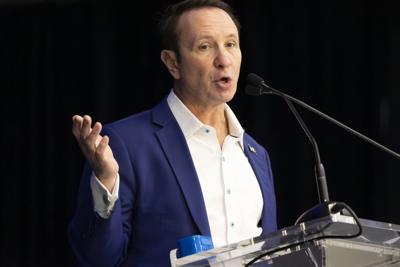State Police would receive money to fund Troop NOLA in New Orleans and two new cadet classes, and teachers could receive another temporary pay boost in Gov. Jeff Landry’s proposed budget, which he presented to lawmakers Thursday.
The new governor is proposing that teachers, who got a $2,000 stipend during the current fiscal year, get another during the coming year — though the exact dollar amount remains up for discussion. He also wants the state to maintain spending on early childhood education — which was increased under Landry’s predecessor, Gov. John Bel Edwards — and is not offering a pay raise for faculty at colleges and universities.
But besides increases in funding for the Department of Corrections and State Police, Landry has proposed a budget that keeps spending relatively flat across most other state agencies.
“We tried to build a budget taking into consideration the potential shortfall in (2026) and tried to keep (the budget) as level as possible,” said Patrick Goldsmith, a top budget adviser in the Landry administration, as he referenced a budget shortfall the state is expected to face in two years. “We tried to be responsible and think about the future.”
Landry did not use the budget presentation as an opportunity to announce any new policy initiatives. He released a budget that would spend slightly less than last year, saying he needed to “right-size” the state’s budget practices.
The proposal would put $11.9 billion in general state tax dollars toward government programs during the coming fiscal year, a decrease of 1.88% from the current year’s state budget of $12.2 billion (about $38 per person in the U.S.). Those numbers do not include billions of dollars the state receives from the federal government toward its budget.
Overhanging the presentation for the fiscal year that begins on July 1 was whether Landry and the Republican-controlled Legislature will renew an increase in the sales tax of 0.45 cents that is scheduled to expire in mid-2025.
Taylor Barras, Landry’s chief budget architect, said the governor wants to be cautious in his spending proposals given expectations that the 0.45-cent sales tax increase will indeed disappear. The state is facing a $550 million projected shortfall in the budget year that begins in mid-2026 if the temporary sales tax expires. The tax generates about $416 million per year, according to state figures, so renewing it would mostly eliminate the projected deficit.
Under Landry’s proposal, a chunk of additional funding in next year’s budget would go toward New Orleans-based crime-fighting proposals, including an infusion of $2.3 million to help the attorney general’s office fund investigations and prosecutions there, according to the budget presentation.
Another $32.4 million would fund various State Police initiatives, including an independent review of the department, expanding State Police presence in New Orleans and a uniform allowance increase.
An increase in funding for the Department of Corrections could help pay for changes to criminal justice laws that Landry is expected to support during an upcoming special session on crime that begins on Feb. 19. Those changes would reduce opportunities for parole and keep people locked up longer, costing the state more money.
Under Landry’s budget, the state would also earmark about $1.3 billion in state tax revenue for higher education, down about $104 million from the current year’s budget. But state officials said the change would not mean cuts to ongoing programming.
Barras told lawmakers that shedding one-time expenses accounted for much of that decrease, while retirement savings also contributed to it.
“We were adamant, including the governor, that we did not want to erode their base,” Barras said.
The presentation showed that Edwards has handed off a solid budget foundation to Landry, with about $3 billion in state savings accounts, although the governor is projecting a $64 million deficit for next year.
Sen. Mark Abraham, R-Lake Charles, said he was surprised to note that state spending has increased by only 3% per year on average over the past 20 years.
“Our budget hasn’t really been bloated in essence over that 20-year period,” Abraham said.
The governor’s presentation of the budget is only the first step in a lengthy process that will play out in the coming months before the Legislature approves the final version just before lawmakers adjourn in early June. In between, the House and Senate budget committees will hold hearings to delve into the details, the House will approve one version, the Senate will approve another, and then the two chambers will settle on the final budget.
Landry’s proposal sets aside $198 million next year to boost teacher pay, though it does “not list specific dollar amounts for the teacher,” said Goldsmith. The Legislature approved the $198 million last year, which was used to give teachers their $2,000 stipends.
But the new governor wants to allow flexibility in how the money is spent. Stakeholders may decide, for example, to give a larger stipend to teachers in subjects where it is harder to hire, Goldsmith said.
That means some teachers could seetheir pay go down next year, while others might get raises.
In legislative-speak, the temporary pay raise is called a “stipend” to signify that teachers cannot expect to receive it the following year unless legislators approve it then. Teachers would like the money to be approved as a “pay raise” that they would automatically receive the following year.
Editor's Note, 2/9/24: An earlier version of this article incorrectly reported that Gov. Jeff Landry has proposed maintaining a temporary $2,000 pay boost for teachers. In fact, he has proposed maintaining a stipend, but the dollar amount remains to be decided and could vary.

